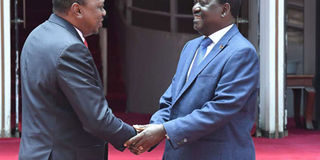After handshake, get the cogs, wheels of country turning fast

President Uhuru Kenyatta and opposition chief Raila Odinga at Harambee House on March 9. FILE PHOTO | NATION MEDIA GROUP
What you need to know:
Many Kenyans happily said goodbye to 2017.
It is important to challenge the myth that this is the end of the Opposition.
A healthy mix of compliments, prodding questions, even criticism, take place and the media plays a key role in this.
The recent formal public meeting between President Uhuru Kenyatta and opposition chief Raila Odinga may well be seen by some as a breach of faith but, for the country, it was a brave step in the direction of healing and moving on.
Many Kenyans happily said goodbye to 2017.
The country and its people had been through a bruising — indeed, tortuous — year and many sighed with relief when it was over.
Besides the incessant election politics, the country was wracked by a lengthy and extensive drought and its debilitating by-products: Inflation, galloping cost of living and increased poverty.
MOVE ON
As we moved into 2018, a strong sentiment was that the nation and its people must move on.
A concurrent feeling held by many was that there was one key challenge President Kenyatta must not buck from: Reconciliation and inclusivity.
Kenya had entered the year bruised and divided.
The winners were elated but the opposition supporters felt flattened and, in some cases, cheated. Tribal divisions sharpened and echoes of the 2007/2008 post-election turmoil rumbled.
It is important to challenge the myth that this is the end of the Opposition.
Kenya and its citizens have matured and are streetwise enough to keep the government on its toes.
The days of being cowed by the government and the arms and legs of the administration get less by the day.
MEDIA'S ROLE
A healthy mix of compliments, prodding questions, even criticism, take place and the media plays a key role in this.
Where necessary, a nudge in the right direction of the various options available is in order. When executive actions are questionable or clearly wrong, more and more people make their voices heard.
There are also the dividing lines between the Executive and the Legislature and the role, indeed right, of all in the latter to check the former.
DIALOGUE AND INCLUSIVITY
If the country can at least have more dialogue and inclusivity from now onwards, it will be better for all. The challenges we face are gargantuan but not insurmountable: They only need dedicated attention.
Now that less negative energy will be expended on these two principals and their supporters fighting and heckling one another, we need to get down to the core short- and long-term challenges.
We must get the cogs and wheels of the economy moving faster. Considering the dynamism of the country and its citizens, an annual growth rate that hovers in the region of around 5 per cent to 6 per cent is, clearly, way below potential.
The government must create an environment for more activities, jobs and gainful opportunities. The emphasis is on ‘environment’; Kenyans will do the rest.
ADMINISTRATIVE INNEFICIENCY
Where the Jubilee administration really needs to get its act together is on the dual role and obligation of purging administrative inefficiency and ineptitude and cleaning out the Aegean stables of corruption.
The latter was brought home to me the other day, when an official from a government agency blatantly asked me if I had agreed the price. The fees for this particular service were abolished some time ago!
Parts of the Auditor-General’s report read like a John Grisham novel; the difference is, the former is cold facts and figures.
Then there is the police service, which clearly needs a complete makeover.
Why the ongoing Kavaludi-led vetting is not open to the media is, surely, an infringement on the rights of Kenyans. It is not a security matter per se. And there are the structural challenges of extreme inequalities of wealth and the international debt.
The fact that the majority of the new Eurobond will go into servicing debts is telling.
Much more of government income and borrowing should be going into goods and services for the population, not servicing debt.
Mr Shaw is an economic and public policy commentator and analyst. [email protected]





